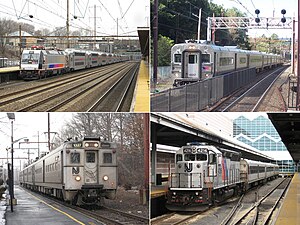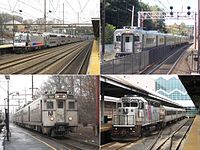NJ Transit Rail Operations
NJ Transit Rail Operations (reporting mark NJTR) is the rail division of NJ Transit. It operates commuter rail service in New Jersey, with most service centered on transportation to and from New York City, Hoboken, and Newark. NJ Transit also operates rail service in Orange and Rockland counties in New York under contract to Metro-North Railroad. The commuter rail lines saw 57,179,000[1] riders in 2023, making it the third-busiest commuter railroad in North America and the longest commuter rail system in North America by route length.
Network and infrastructure
The lines operated by NJ Transit were formerly operated by the Pennsylvania Railroad, Central Railroad of New Jersey, New York and Long Branch Railroad, and Erie Lackawanna Railroad, most of which date from the mid-19th century. From the 1960s onward, the New Jersey Department of Transportation began funding the commuter lines. By 1976, the lines were all operated by Conrail under contract to NJDOT. The system took its current form in 1983, when NJ Transit took over all commuter service in New Jersey. NJ Transit Rail Operations is divided into the Hoboken Division and the Newark Division. The two networks were not integrated until the opening of Secaucus Junction in 2003, which enabled passengers to transfer between lines bound for New York and Hoboken.
Lines
As of 2022, NJ Transit's commuter rail network consists of 12 lines and 165 stations, primarily concentrated in northern New Jersey, with one line running between Atlantic City and Philadelphia.[2]
Current lines
Operations are in two divisions:
- Hoboken Division, formerly operated by the Erie Lackawanna Railroad, runs from Hoboken Terminal or through Newark – Broad Street and includes Midtown Direct service via the Kearny Connection. Most station platforms are low-level.
- Newark Division, formerly operated by the Pennsylvania Railroad, Central Railroad of New Jersey and New York and Long Branch Railroad, operates through Newark Penn Station via the Northeast Corridor, with most trains continuing to New York Penn Station. This division also includes the Atlantic City Line formerly operated by the Pennsylvania-Reading Seashore Lines. Most station platforms are high-level.
| Lines | Terminals | ||
|---|---|---|---|
| Northeast Corridor Line | New York Penn Station | Trenton Jersey Avenue (some peak weekday trains) | |
| Princeton Branch | Princeton Junction | Princeton | |
| North Jersey Coast Line | New York Penn Station Hoboken Terminal (limited service) |
Long Branch (electric service) Bay Head (diesel service) | |
| Raritan Valley Line | Newark Penn Station (most trains) New York Penn Station (limited weekday trains) Hoboken Terminal (1 inbound weekday train) |
Raritan (most trains) High Bridge (limited weekday trains) | |
| Atlantic City Line | Philadelphia 30th Street Station | Atlantic City | |
| Lines | Terminals | ||
|---|---|---|---|
| Main Line | Hoboken Terminal | Suffern | |
| Bergen County Line | Suffern (weekday service) Waldwick (weekend service) | ||
| Pascack Valley Line | Spring Valley | ||
| Port Jervis Line | Port Jervis | ||
| Meadowlands Rail Line | Secaucus Junction Hoboken Terminal (limited service) |
Meadowlands | |
| Montclair-Boonton Line | Hoboken Terminal New York Penn Station (Midtown Direct service) |
Montclair State University (weekday electric service) Hackettstown (limited weekday diesel service) Bay Street (weekend service) | |
| Morristown Line | Dover (electric service) Hackettstown (limited weekday diesel service) | ||
| Gladstone Branch | Hoboken Terminal (weekday service) New York Penn Station (Midtown Direct service, weekdays only) Summit (weekend service) |
Gladstone | |
Freight usage

Although NJ Transit itself does not carry freight, NJTR allows freight service to be operated over its lines via trackage rights agreements with several railroads. Conrail Shared Assets Operations (CSAO), CSX, Norfolk Southern (NS) and several short lines (Cape May Seashore Lines (CMSL), Dover and Delaware River Railroad (DD), Morristown & Erie Railway (M&E), and Southern Railroad of New Jersey (SRNJ) currently have trackage rights contracts to operate freight service on NJ Transit lines. The Morristown & Erie Railway can only use NJT trackage to get between its owned trackage; it cannot serve customers on NJ Transit trackage. A similar situation exists for Conrail on the Atlantic City Line.
Below is a list of NJ Transit lines and freight lines that operate on them:
- Morristown Line: DD, M&E
- Montclair-Boonton Line: DD, M&E
- Main Line: NS, M&E
- Bergen County Line: NS, M&E
- Pascack Valley Line: NS
- Raritan Valley Line: CSAO
- North Jersey Coast Line: CSAO
- Atlantic City Line: CSAO, SRNJ
Non-passenger lines
NJTR also owns several lines not used for regular passenger service. These lines were purchased by the New Jersey Department of Transportation in the late 1970s for railbanking purposes, with ownership transferring to NJ Transit upon its creation in 1979. These lines are either leased for freight/tourist service, interim rail trail use, or remain derelict:
- Harrison-Kingsland Branch: derelict
- Raritan Valley Line:
- High Bridge-Bloomsbury: NS
- Bloomsbury-Phillipsburg: trackage removed due to construction of Interstate 78 in 1989
- Red Bank -South Lakewood: Conrail Shared Assets Operations (CSAO), Delaware and Raritan River Railroad
- Woodmansie-Winslow Junction: derelict
- Beesley's Point Secondary:
- Winslow Junction-Palermo/Beesley's Point: CSAO, Cape May Seashore Lines
- Palermo-Ocean City: leased to city of Ocean City in 1999 for use as interim Ocean City Bike Path rail trail
- Tuckahoe-Cape May: Cape May Seashore Lines, Southern Railroad of New Jersey
- HX Interlocking (Hackensack River)-Croxton Yard: realigned for Secaucus Junction, used as yard lead by NS
- Freehold-Farmingdale: derelict
- Freehold-Matawan: leased to Monmouth County Park System until 2020 as interim section of Henry Hudson Trail
Ownership
NJT owns most of its tracks, infrastructure, bridges, tunnels and signals. The exceptions are:
- Atlantic City Line – Philadelphia 30th Street Station to Frankford Junction (owned by Amtrak) and Frankford Junction to Pennsauken Delair Junction (owned by Conrail)
- Northeast Corridor Line – entire line except Morrisville Yard (owned by Amtrak)
- Port Jervis Line – Suffern to Port Jervis (owned by Norfolk Southern and leased by Metro-North)
- Raritan Valley Line – Aldene to Hunter (owned by Conrail)
Yards and maintenance
NJ Transit's main storage and maintenance facility is the Meadows Maintenance Complex in Kearny, New Jersey. Other major yard facilities are located at Hoboken Terminal. Amtrak's Sunnyside Yard in Queens, New York serves as a layover facility for trains to New York Penn Station. Additional yards are located at outlying points along the lines. These include:[3]
- Main and Bergen County Lines:
- Waldwick Yard
- Suffern Yard
- Montclair-Boonton Line:
- Great Notch Yard, Little Falls
- Morris and Essex Lines:
- Gladstone Yard
- Summit Yard
- Dover Yard
- Port Morris Yard
- North Jersey Coast Line:
- Long Branch Yard
- Bay Head Yard
- Northeast Corridor:
- Morrisville Yard, Morrisville, PA (near the Trenton Transit Center)
- County Yard, New Brunswick (near Jersey Avenue)
- Hudson Yard, Harrison (Serves mostly Raritan Valley Line trains)
- Pascack Valley Line:
- Woodbine Yard, Spring Valley, NY
- Port Jervis Line:
- Port Jervis Yard, Port Jervis, NY
- Raritan Valley Line:
- Raritan Yard
- Hudson Yard, Harrison (Shared with Northeast Corridor)
NJT has a fleet of maintenance crews and vehicles that repair tracks, spread ballast, deliver supplies and inspect infrastructure. There are eight non-revenue work diesels used for these purposes.
Movable bridges
NJT utilizes numerous moveable bridges:
- Dock Bridge, Newark (Passaic River) – Northeast Corridor Line (vertical lift) (owned and operated by Amtrak)
- Portal Bridge, Secaucus (Hackensack River) – Northeast Corridor Line (swing) (owned and operated by Amtrak)
- Newark Draw, Newark (Passaic River) – Morristown Line (swing)
- Lower Hack Lift, Jersey City (Hackensack River) – Morristown Line (vertical lift)
- Upper Hack Lift, Secaucus (Hackensack River) – Main Line (vertical lift)
- HX Draw, Secaucus (Hackensack River) – Bergen County Line and Pascack Valley Line (bascule)
- Lyndhurst Draw, Lyndhurst (Passaic River) – Main Line (swing)
- River Draw, South Amboy (Raritan River) – North Jersey Coast Line (swing)
- Morgan Draw, Old Bridge (Cheesequake Creek) – North Jersey Coast Line (bascule)
- Oceanport Draw, Oceanport (Oceanport Creek) – North Jersey Coast Line (swing)
- Shark River Draw, Belmar (Shark River) – North Jersey Coast Line (bascule)
- Brielle Draw, Brielle (Manasquan River) – North Jersey Coast Line (bascule)
- Beach Bridge, Atlantic City (Beach Thorofare) – Atlantic City Line (swing)
- Delair Bridge, Pennsauken (Delaware River) – Atlantic City Line (vertical lift) (owned and operated by Conrail)
Rolling stock
NJ Transit operates a fleet of 175 locomotives and over 1,200 passenger cars.
Locomotives
| Builder and model | Photo | Numbers | Number active | Type | Built |
|---|---|---|---|---|---|
| EMD GP40PH-2 | 
|
4100, 4101, 4109 | 3 | Diesel | 1968 |
| EMD GP40PH-2B | 
|
4200–4219 | 19 | 1965–1969 | |
| EMD F40PH-2CAT | 
|
4119, 4120 | 2 | 1981 | |
| Alstom PL42AC | 
|
4000–4032 | 29 | 2005–2006 | |
| Bombardier ALP-46 | 
|
4600–4628 | 29 | Electric | 2001–2002 |
| Bombardier ALP-46A | 
|
4629–4664 | 36 | 2010–2011 | |
| Bombardier ALP-45DP | 
|
4500–4534 | 60 | Dual-mode (electric and diesel)[4] |
2011–2012 |
| Bombardier/Alstom ALP-45A | 
|
4535-4559 | 2021–present |
Passenger cars
NJ Transit has a fleet of over 1,100 passenger cars. The fleet and examples are described below.
| Builder and model | Photo | Numbers | Total | Built |
|---|---|---|---|---|
| GE Arrow III | 
|
1304–1333 | 30 single cars (no lavatory) | 1977 |
| 1334–1533 | 200 paired cars (lavatory in odd cars) | |||
| Bombardier Comet II | 
|
5300–5460 | 161 trailers (no lavatories) | 1982–1989 |
| Bombardier Comet IV | 
|
5011–5031 | 21 cab cars (lavatory) | 1996 |
| 5235–5264 | 30 trailers (lavatory) | |||
| 5535–5582 | 48 trailers (no lavatory) | |||
| Alstom Comet V | 
|
6000–6083 | 84 cab cars (lavatory) | 2002–2004 |
| 6200–6213 | 14 trailers (lavatory) | |||
| 6500–6601 | 102 trailers (no lavatory) | |||
| Bombardier MultiLevel Coach | 
|
7000–7051 | 52 cab cars (lavatory) | 2006–2010 |
| 7200–7298 | 99 trailers (lavatory) | |||
| 7500–7677 | 178 trailers (no lavatory) | |||
| Bombardier MultiLevel Coach II | 
|
7052–7061 | 10 cab cars (lavatory) | 2012–2013 |
| 7678–7767 | 90 trailers (no lavatory) |
Stations

NJ Transit provides passenger service on 12 lines at total of 165 stations, some of which are operated in conjunction with Amtrak and Metro-North (MNCW).[5]
References
- ^ "Transit Ridership Report Fourth Quarter 2023" (PDF). American Public Transportation Association. March 4, 2024. Retrieved September 5, 2024.
- ^ "NJT Facts at a Glance".
- ^ Rouse, Karen (November 16, 2012). "NJ Transit's rail fleet hit hard by storm". The Record. Retrieved August 11, 2013.
- ^ Bombardier Press release
- ^ "New Jersey Transit At A Glance" (PDF). New Jersey Transit. 2014. Retrieved December 25, 2015.





